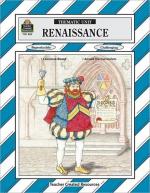|
This section contains 356 words (approx. 2 pages at 300 words per page) |

|
Before the Renaissance, education was strictly controlled by the church. Teachings about history, science, and the arts had to conform to biblical statements, as interpreted by the church. A scientist making claims that contradicted religious teachings could find himself in prison. However, the Renaissance, with its emphasis on reason, logic, and scientific observation, ushered in a new way of appreciating as well as acquiring knowledge. Reason and objective scientific observation were now promoted by the best minds of the age. This resulted in a steady stream of scientific discoveries and inventions that rattled traditional beliefs and changed the way people looked at themselves, their world, and their place in the universe.
The most significant scientific challenge to medieval thinking was the discovery that the earth was not the center of the universe, around which all the planets and the sun revolved. In advancing his theory...
|
This section contains 356 words (approx. 2 pages at 300 words per page) |

|




